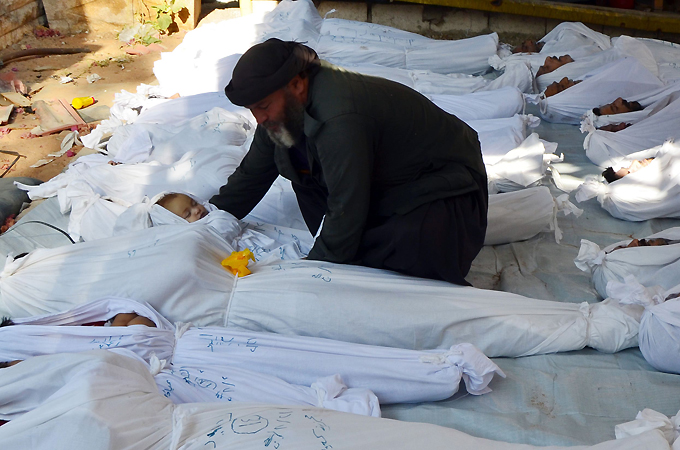Report says there is "clear evidence" chemical weapons were used in last month's
attack in Damascus suburbs.
Last Modified: 16 Sep 2013 19:10
|
|
UN investigators have found "clear and convincing evidence'' that chemical weapons were
used on a relatively large scale in an attack last month in Syria that killed hundreds of people.
As expected, the report, released on Monday, did not say who launched the attack in the
rebel-held Damascus suburb of Ghouta.
It said: "The environmental, chemical and medical samples we have collected provide clear
and convincing evidence that surface-to-surface rockets containing the nerve agent sarin were
used ... in the Ghouta area of Damascus'' on August 21
"The conclusion is that chemical weapons have been used in the ongoing conflict between the parties in the Syrian Arab Republic ... against civilians, including children, on a relatively large scale,'' the report said.
The report specifically mentioned the areas of Ein Tarma, Moadamiyeh and Zamalka.
Addressing the media after he had presented the report to the United Nations Security Council, Ban Ki-Moon described the chemical attack as a "war crime".
"It is the worst use of chemical weapons on civilians in the 21st century,"he said.
The report said that weather conditions had ensured that as many people as possible were
injured or killed.
Temperatures were falling between 2am and 5am, it said, which meant that air was not moving upwards but downwards towards the ground.
"Chemical weapons use in such meteorological conditions maximises their potential impact as
the heavy gas can stay close to the ground and penetrate into lower levels of buildings and constructions where many people were seeking shelter," it said.
The August 21 attack took place as a UN chemical weapons team was in Syria to investigate earlier reported attacks.
After days of delays, the inspectors were allowed access to victims, doctors and others in the Damascus suburbs.
The inspectors were mandated to report on whether chemical weapons were used and if so
which ones - not on who was responsible.
The opposition and its Western and Arab supporters blame President Bashar Assad's regime
for the attack in the rebel-controlled area of Ghouta.
The Assad regime insists that the attack was carried out by rebels.
Chief weapons inspector Ake Sellstrom handed over the report to UN chief Ban Ki-moon on Sunday amid a flurry of diplomatic activity aimed at getting Syria to put its just-acknowledged stockpile of chemical weapons and chemical precursors under international control for
destruction.
In Geneva, the chairman of a UN war crimes panel on Monday said it was investigating 14 suspected chemical attacks in Syria, dramatically escalating the stakes after diplomatic breakthroughs that saw the Syrian government agree to dismantle its chemical weapons
program.
War crimesPaulo Sergio Pinheiro said the Geneva-based UN panel he heads has not pinpointed the chemical used in the attacks and is awaiting evidence from the separate team of UN chemical weapons inspectors.
Pinheiro also said the panel believes Assad's government has been responsible for war crimes and crimes against humanity, while rebel groups have perpetrated war crimes but not crimes against humanity "because there is not a clear chain of command.''
Those who blame Assad for the chemical attack and supported military strikes say it is up to
Assad to uphold his end of any deal.
John Kerry, US secretary of state, has acknowledged that a chemical arms deal would have little immediate effect on the bloodshed in Syria, which has killed more than 100,000 people, but he said full compliance was a key first step.
In Geneva, Pinheiro said the "vast majority'' of casualties in Syria's civil war came from conventional weapons like guns and mortars.
|
|
Source:
Al Jazeera and agencies
|
|



No comments:
Post a Comment